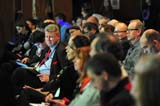Could students take charge of their own education?
 Berlin (GER), November 2016 - They are already beginning to do exactly that - and what's happened so far is just the tip of the iceberg, according to many of the experts scheduled to speak at OEB, Europe's leading conference on technology-assisted learning. The theme of this year's conference, which will take place at the Intercontinental Hotel in Berlin from November 30 to December 2, is "Owning Learning" - a subject which, experts say, is likely to transform education.
Berlin (GER), November 2016 - They are already beginning to do exactly that - and what's happened so far is just the tip of the iceberg, according to many of the experts scheduled to speak at OEB, Europe's leading conference on technology-assisted learning. The theme of this year's conference, which will take place at the Intercontinental Hotel in Berlin from November 30 to December 2, is "Owning Learning" - a subject which, experts say, is likely to transform education.
"The ownership of learning is one of the hottest topics in education and training today," says Rebecca Stromeyer, Managing Director of ICWE GmbH, the conference organisers. "Innovations in technology have made developments that were previously unimaginable quite possible now. We're in the midst of an extraordinary era of change and one of the areas in which this change is already being felt is in the ownership and control students can have over their own learning. They can choose what and how they want to learn, mixing and matching courses and programmes to suit their own interests and needs. Technology is making all this possible and, right across the world, it is starting to have an enormous impact. There are huge challenges and opportunities. Tomorrow's students will own their own learning and training."
The full programme for OEB is now online and the line-up of keynote speakers suggests that the conference could set the agenda for future developments in the ownership of learning, pointing the way to new areas of opportunity.
OEB has put together a fascinating collection of thinkers and technology experts to create three days of intensive discussions, which are likely to cast some light on the shape of future education and training. Keynote speakers, who'll be contributing their insights and ideas, include:
- Nell Watson, an engineer, an entrepreneur, and a 'futurist thinker.' He lectures all over the world on machine intelligence, human-machine relations, and the future of society
- Tricia Wang, a global tech ethnographer and the designer of human-centred research systems, which integrate data science and social science
- Roger Schank, a leading visionary in artificial intelligence, learning theory, cognitive science, and the building of virtual learning environments
- Andreas Schleicher, the Director for Education and Skills, and special advisor on education policy to the Secretary-General, at the OECD
They'll be speaking to OEB's audience of more than 2,300 participants from over 100 countries, as part of a rich programme, which this year features 'tech labs' on subjects such as 'conceptualisation of interactive videos,' 'boardrooms' on new education initiatives for refugees and displaced populations, and interactive sessions with themes such as 'teaching escape room experiences in multiple educational contexts.'
The programme contains some long-time conference favourites too. The 'Spotlight Stage' will again serve its role as home for unconventional ideas. This year speakers will include Jeff Staes from Belgium, who'll argue that "passion-based learning is destroying today's educational system" and MIT Media Lab's Philipp Schmidt, who'll reveal "how MIT (really) learns."
And the OEB debate will be back for another lively discussion - this year the participants will be arguing about whether robots can replace teachers.
As always, OEB hosts a large exhibition, showcasing the latest innovations and initiatives in technology-assisted learning. This year, with more than 80 international exhibitors, the exhibition should be busier than ever before.
Dom Graveson, Founding Partner, Hominal: "OEB is the one absolutely unmissable constant in the education calendar for the year. Every event I have attended over the past decade has left me deeply inspired, informed and invigorated. The quality of discussion is unsurpassed and covers all aspects of ed-tech from operational best practice to policy and social impact. This year's programme is better than ever - full of important subjects to discuss, lots of chances to learn about new developments and challenge and grow your own thinking, and plenty of opportunities for lots of fun. Seriously, if you or your organisation has ambition in this area, you need to be there."
Fun at OEB comes in the shape of the OEB Party, which this year will celebrate Berlin's status as an international hub by harking back to the city's days under allied occupation. The 'Occupied' party will feature food and music from the four allied countries responsible for administering the city after the war.





